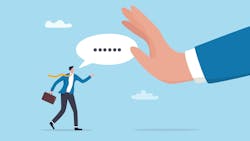Some folks like liver and onions, and some don't. Some folks are good negotiators, and some aren't. In today's industry, it can take a full day or more to write an estimate and research and review OEM procedures.
It's a widespread belief and understanding that shops must play middleman between the customer and the insurance company. Let’s be clear: we are not in the business of negotiating claims. We’re in the business of repairing vehicles — properly, transparently, and according to OEM repair procedures.
At our shop, we make it known from the very beginning — we do not engage with insurance companies. We are honest and transparent with every client that walks through our door. That kind of transparency matters because it sets the tone for the entire repair experience. As a matter of fact, we spell it out in our repair contract that customers must sign.
I realize that some shops find themselves in positions to negotiate claims and some shops feel inclined to do so because of their state laws or they must do so to scale their businesses. If you are struggling and wonder how other shops deal with this matter, this is our approach.
Why We Don’t Engage with Insurance Companies
Over the years, we’ve seen it all. Some managers would stand their ground so firmly that it created tension and heartache for everyone involved. Others would bend over backward just to keep the job, even if it meant giving away the farm and losing money on the repair. Neither approach works. That’s why we’ve drawn a hard line in the sand.
Here's the truth: we are not negotiators, and we don’t pretend to be. Our focus is, and always has been, on safe, proper repairs. That means we write our estimates based on what the vehicle actually needs, not what someone behind a desk thinks we should do to save a buck. I might say we are horrible negotiators because the word negotiate means “to deal or bargain with,” meaning you have something to give away. Our estimates are based on visible and provable damage. We don't add a fudge factor, so we don't have anything to give away.
Our estimates do not include fees for “meeting, fussing, cussing, or discussing” with insurers because we simply don’t do it. It is a time-consuming and frustrating process to do those things. Even if you have a close relationship with an insurer now, it likely won’t last long. Our estimates are written to perform the job right, period. Everything we do is by the book — OEM repair standards, proper documentation, safe procedures, and no shortcuts.
Advocates, Not Negotiators
Let's be clear: we are fierce advocates for our clients. We make sure they understand their rights, the condition of their vehicle, and the repairs that are necessary. We help them make informed decisions, but what we don’t do is try to hash out deals with insurance companies.
Why? Because negotiating a claim is, quite frankly, not our legal role. If it were legal for us to negotiate property damage claims on behalf of our customers then, by that same logic, we’d also be negotiating their personal injury claims. And we all know who gets involved when the real money's at stake — attorneys.
You’ve never seen a personal injury lawyer racing to take on a property damage claim because there’s just no money in it. That’s the reality. If lawyers, who are trained and licensed to negotiate, steer clear of this side of the industry, then why on earth would a body shop put themselves in that position?
Repairs Take Time, Skill, and Process
Anyone who’s spent time in this industry knows proper repairs aren’t simple. There are dozens, sometimes hundreds, of tasks that go into bringing a damaged vehicle back to OEM standards. Scanning, measuring, calibrating, disassembling, documenting — it’s not just painting and pounding.
We don’t have time to play insurance adjuster and, more importantly, it’s not our responsibility. Our role is to restore a vehicle to its pre-loss condition, or better, safely and correctly. That takes resources, focus, and a commitment to doing it right the first time.
When shops allow themselves to be pulled into claim negotiations, they compromise that focus. They start thinking in terms of what can be “covered,” instead of what needs to be done. And that’s a dangerous mindset not just for the shop, but for the customer and their safety.
Empowering the Customer
Instead of stepping into a role we’re not legally allowed or qualified to perform, we believe in empowering our customers. We share education, transparency, and resources that are commonly available. We explain the repair plan, walk them through their options, and show them exactly what needs to be done and why.
We also point them to helpful consumer advocacy websites such as www.yourvehicleyourchoice.com and www.stopdrp.
These resources might help consumers understand their rights and navigate the often-confusing world of insurance claims and collision repair. They also provide recommendations to help resolve claim issues or file complaints with the appropriate agencies. When they’re informed, they’re better equipped to stand their ground, and we’re here to back them up with the facts, documents, and expertise to support their decisions.
We’re Not Playing Both Sides
Trying to please both the insurer and the customer is a fast track to failure. It leads to compromises, missed procedures, and liability. We don’t play that game. We work for the vehicle owner, and only the vehicle owner.
That means:
- We write for the vehicle’s needs.
- We document everything.
- We perform repairs the right way, every time.
- We stay out of the claims game.
It’s not about being difficult. It’s about staying true to what we do best.
Final Thoughts: Stay in Our Lane
There’s a lot of pressure out there for shops to conform to the insurance-driven model, but the ones that succeed — the ones that build trust and deliver real value — are the shops that stay in their lane.
We repair cars well in a timely manner. We do it with transparency, honesty, and a commitment to quality. We don’t negotiate claims and we don’t cut deals behind closed doors. What we do is advocate, inform, and repair — nothing more, and certainly nothing less.
If you're in this industry and you’re tired of the back-and-forth with insurers, maybe it’s time to draw your own line in the sand. When you focus on repairs instead of negotiations, everybody wins — especially the customer.
About the Author

Shey Knight
Shey Knight graduated from Jacksonville State University with a Bachelor of Science in Production Management and a minor in Real Estate. After graduating, Shey worked for CKM realty and was the youngest broker/ Realtor in Birmingham, Alabama, while working with Southtrust bank. Shey was recruited back to Autosport in 1990, where he began his career in auto collision repair. Shey currently serves as an Opelika Rotarian and has served on the board and as president. He currently serves on several boards including the Opelika Chamber of Commerce Foundation board, the CCRE and as Treasurer for GSCA (Gulf States Collision Association). He has served on past boards and roles including Opelika Chamber of Commerce and Board Chairman, Disaster Team Captain for the Lee County Red Cross and board member, board member and past president for the Opelika-Auburn Jaycees, board member for Southern Union State Junior College collision repair advisory board and Youth for Christ Board. Shey serves as CFO for Autosport Bodyworks, also co-owns Vinyl Guys (a vinyl installation company) and is a licensed property and casualty insurance agent and professional sand sculptor. Shey is married to Terri Knight, where she teaches at Auburn University. They have two adult children and enjoy traveling, camping, riding motorcycles, snow skiing, scuba diving, gardening and enjoying their first granddaughter.
